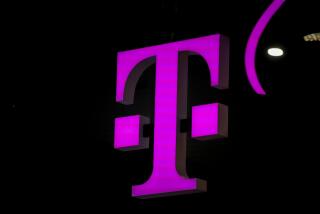U S Sprint May Have Won More Than Contract : Analysts Say Share in Building Federal Phone Network May Push It Past MCI
- Share via
In awarding U S Sprint Communications a 40% share of the multibillion-dollar federal telephone contract, the General Services Administration may have shifted the balance of power in the nation’s $50-billion long-distance telecommunications business, industry analysts said Thursday.
Only a year ago, some analysts feared that mounting losses would drive Sprint--a joint venture of United Telecommunications and GTE Corp.--out of the long-distance market. Such talk was muted by the venture’s success this year in slashing losses and its upset victory on Wednesday in the three-way bidding for a piece of the government’s massive telecommunications overhaul project known as FTS-2000.
Some analysts even predicted that Sprint might overtake MCI Communications--part of an unsuccessful third bidding team headed by Martin Marietta Corp.--as the nation’s No. 2 long-distance carrier, behind American Telephone & Telegraph. A team headed by AT&T; won the 60% share of the 10-year project, which could be worth up to $25 billion.
(The actual value will depend on maximum estimated growth of the government’s telecommunications usage over the next 10 years under the new network, which will be capable of carrying conversations, computer data and images simultaneously over the same telephone line. The contracts cover long-distance service for all civilian agencies of government, except the U.S. Postal Service. The Pentagon, which has its own communications system, may place its non-military transmissions into the new system, the GSA said.) “This could raise Sprint to an equal or even higher footing with MCI,” said analyst Jack Grubman of Paine Webber.
But Robert B. Morris III of Goldman, Sachs & Co. pointed to Sprint’s award as “a risky venture”--particularly since it alone among the three bidders has no hefty or knowledgeable partner to share the burden. AT&T;, mighty as it is, is backed by such other heavy hitters as Seattle’s Boeing Co. and Computer Sciences Corp. of El Segundo. And besides Martin Marietta and MCI, the losing team’s subcontractors included GE-RCA Americacom and McDonnell-Douglas Tymnet.
Sprint’s original partner in the bidding, EDS Corp., withdrew earlier in the competition, but the Kansas City, Mo.-based carrier decided to go it alone.
“This is more than the provision of long distance,” Morris said of the project. “They are going to have to manage (outside) hardware vendors and maintenance suppliers. They are going to have to manage the Bell operating companies.”
Moreover, he added, by aggressively pricing its bid Sprint left little room for cost overruns. “The long-term risk is whether they can pull it off and still make money.”
More to Read
Inside the business of entertainment
The Wide Shot brings you news, analysis and insights on everything from streaming wars to production — and what it all means for the future.
You may occasionally receive promotional content from the Los Angeles Times.










